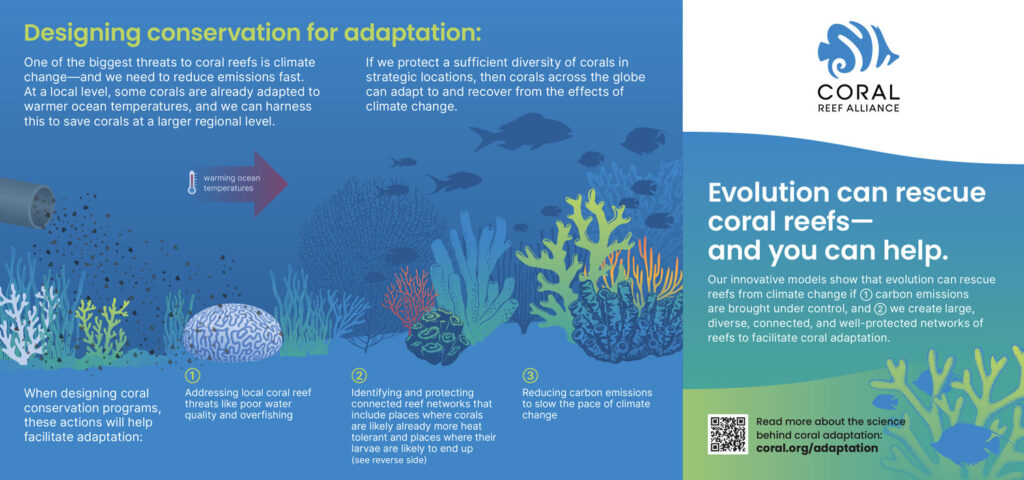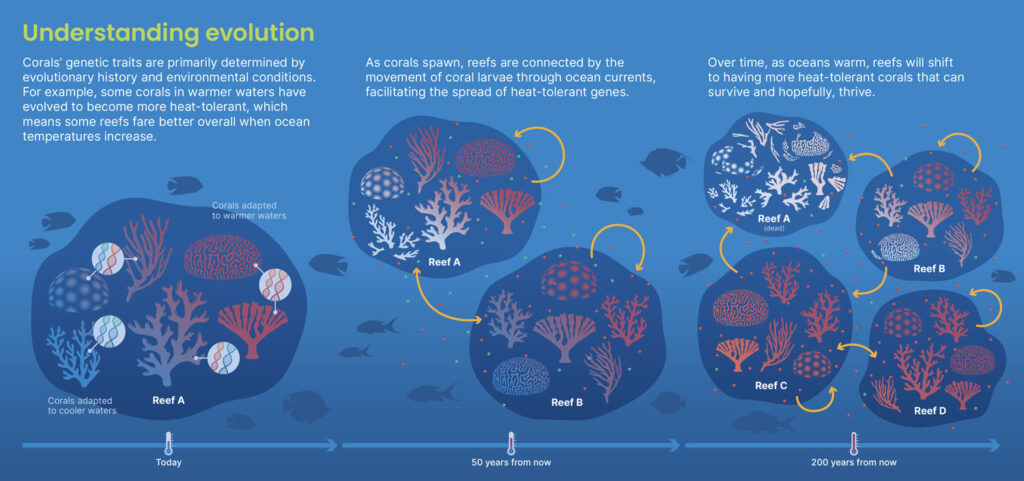Corals Can Adapt When We Let Them
We believe in the regenerative capacity of reefs to withstand stressors that are difficult to control – and our work is focused on developing the playbook on what to do before, during, and after bleaching events to give those reefs the best possible chance to bounce back. This is urgent work and we need all hands on deck to help with this effort.
We need to help corals evolve and thrive by reducing local threats such as wastewater, and overfishing and we need to urgently reduce our greenhouse emissions.
Our adaptation work in a nutshell
- Corals are continually evolving. It’s important to protect corals in warmer waters since those that survive a bleaching event may be heat-tolerant.
- As corals spawn, these heat tolerant genes mix with corals from cooler water, helping them further adapt to increasing temperatures.
- Over time, by protecting both heat tolerant and corals in cooler areas, as the ocean warms overall, genes will shift to help corals thrive in warmer waters.


For more information on the infographic above, visit Coral Reefs can Adapt to Climate Change >
Upcoming research for coral bleaching mitigation and climate change impacts
Scientists are conducting a wide range of experiments and research initiatives to help address coral bleaching and develop strategies to enhance the resilience of coral reefs. Some of the key experiments and approaches currently being explored include:
Coral Microbiome Research
Scientists are studying the coral microbiome, which includes the diverse community of microorganisms living in and around corals. Understanding how these microorganisms interact with corals and influence their health and stress responses can provide insights into potential mitigation strategies.
Coral Restoration and Transplantation
Researchers are testing different coral restoration techniques and approaches to restore damaged or degraded reefs. By cultivating coral fragments in nurseries and then transplanting them onto reefs, scientists aim to speed up recovery and promote the growth of resilient coral colonies, although this is unlikely to work if local threats (such as poor water quality) aren’t addressed. Check more in this article.
“Super Corals”
Selective Breeding
Researchers are exploring the possibility of selective breeding to develop heat-tolerant coral strains. By identifying naturally resilient corals and breeding them to pass on their heat-tolerant traits, scientists aim to create more resilient coral populations that can better withstand bleaching events.
Assisted Evolution
Some researchers are investigating assisted evolution techniques, such as exposing corals to gradually increasing temperatures over multiple generations to encourage the development of heat tolerance. The goal is to speed up the natural evolutionary process to help corals adapt to rapidly changing environmental conditions.
Coral Cryopreservation
Scientists are exploring methods to freeze and store coral gametes (sperm and eggs) for future use. Cryopreservation could potentially serve as a genetic repository to conserve coral diversity and support future restoration efforts.
Coral Disease Management
Studies are underway to understand coral diseases better and develop management strategies to mitigate their impacts. Disease outbreaks can exacerbate the effects of bleaching events, so addressing coral diseases is essential for reef health. Some of these studies are also studying and testing coral probiotics in laboratories or in the field.
Zooxanthellae Experiments
Scientists are experimenting with manipulating the composition of symbiotic algae (zooxanthellae) known as clades within corals. By introducing heat-tolerant algae or manipulating the algae communities, researchers aim to increase coral resilience to bleaching.
Artificial Structures and Shading
Researchers are testing the effectiveness of artificial structures and shading to reduce light and temperature stress on corals. By creating artificial shading or structures that mimic the complexity of natural reefs, scientists hope to protect corals from extreme light conditions that further stress corals.
Biochemical and Genetic Analysis
Advanced techniques are employed to gain a deeper understanding of how corals respond at the molecular level to stress and bleaching events.
Ocean Acidification Studies
Scientists are investigating the impact of ocean acidification, another consequence of increased carbon dioxide in the atmosphere, on coral resilience. Understanding how acidification affects coral calcification and growth can inform conservation strategies.These experiments and research initiatives are essential for advancing our knowledge of coral bleaching and developing evidence-based strategies for coral reef conservation and management. It is important to note that while research shows promising results, implementing effective solutions on a large scale requires a combination of science, policy, and community engagement to address the complex challenges facing coral reefs worldwide. Because of these challenges of scale, we at the Coral Reef Alliance are focusing on reducing local threats and building networks of healthy, diverse coral reefs.